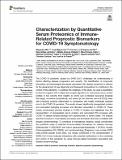Por favor, use este identificador para citar o enlazar a este item:
http://hdl.handle.net/10261/253409COMPARTIR / EXPORTAR:
 SHARE SHARE
 CORE
BASE CORE
BASE
|
|
| Visualizar otros formatos: MARC | Dublin Core | RDF | ORE | MODS | METS | DIDL | DATACITE | |

| Título: | Characterization by quantitative serum proteomics of immune-related prognostic biomarkers for COVID-19 symptomatology |
Autor: | Villar, Margarita CSIC ORCID; Urra, José Miguel; Rodríguez del‐Río, Francisco J.; Artigas-Jerónimo, Sara CSIC ORCID; Jiménez-Collados, Natalia; Ferreras-Colino, Elisa CSIC ORCID; Contreras, Marinela CSIC ORCID ; Fernández de Mera, Isabel G. CSIC ORCID; Estrada-Peña, Agustín; Gortázar, Christian CSIC ORCID ; Fuente, José de la CSIC ORCID | Palabras clave: | COVID-19 Proteomics Immunology Biomarkers Diagnostic Prognostic Symptomatology |
Fecha de publicación: | 8-sep-2021 | Editor: | Frontiers Media | Citación: | Frontiers in Immunology 12: 730710 (2021) | Resumen: | The COVID-19 pandemic caused by SARS-CoV-2 challenges the understanding of factors affecting disease progression and severity. The identification of prognostic biomarkers and physiological processes associated with disease symptoms is relevant for the development of new diagnostic and therapeutic interventions to contribute to the control of this pandemic. To address this challenge, in this study, we used a quantitative proteomics together with multiple data analysis algorithms to characterize serum protein profiles in five cohorts from healthy to SARS-CoV-2-infected recovered (hospital discharge), nonsevere (hospitalized), and severe [at the intensive care unit (ICU)] cases with increasing systemic inflammation in comparison with healthy individuals sampled prior to the COVID-19 pandemic. The results showed significantly dysregulated proteins and associated biological processes and disorders associated to COVID-19. These results corroborated previous findings in COVID-19 studies and highlighted how the representation of dysregulated serum proteins and associated BPs increases with COVID-19 disease symptomatology from asymptomatic to severe cases. The analysis was then focused on novel disease processes and biomarkers that were correlated with disease symptomatology. To contribute to translational medicine, results corroborated the predictive value of selected immune-related biomarkers for disease recovery [Selenoprotein P (SELENOP) and Serum paraoxonase/arylesterase 1 (PON1)], severity [Carboxypeptidase B2 (CBP2)], and symptomatology [Pregnancy zone protein (PZP)] using protein-specific ELISA tests. Our results contributed to the characterization of SARS-CoV-2–host molecular interactions with potential contributions to the monitoring and control of this pandemic by using immune-related biomarkers associated with disease symptomatology. | Versión del editor: | https://doi.org/10.3389/fimmu.2021.730710 | URI: | http://hdl.handle.net/10261/253409 | DOI: | 10.3389/fimmu.2021.730710 | E-ISSN: | 1664-3224 |
| Aparece en las colecciones: | (PTI Salud Global) Colección Especial COVID-19 (IREC) Artículos |
Ficheros en este ítem:
| Fichero | Descripción | Tamaño | Formato | |
|---|---|---|---|---|
| fimmu-12-730710.pdf | 18,01 MB | Adobe PDF |  Visualizar/Abrir |
CORE Recommender
SCOPUSTM
Citations
29
checked on 11-may-2024
WEB OF SCIENCETM
Citations
28
checked on 25-feb-2024
Page view(s)
74
checked on 15-may-2024
Download(s)
154
checked on 15-may-2024
Google ScholarTM
Check
Altmetric
Altmetric
Este item está licenciado bajo una Licencia Creative Commons

